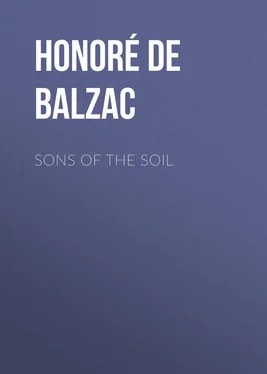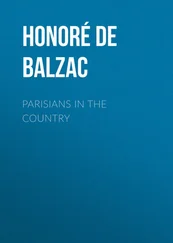Honoré Balzac - Sons of the Soil
Здесь есть возможность читать онлайн «Honoré Balzac - Sons of the Soil» — ознакомительный отрывок электронной книги совершенно бесплатно, а после прочтения отрывка купить полную версию. В некоторых случаях можно слушать аудио, скачать через торрент в формате fb2 и присутствует краткое содержание. Жанр: literature_19, foreign_antique, foreign_prose, на английском языке. Описание произведения, (предисловие) а так же отзывы посетителей доступны на портале библиотеки ЛибКат.
- Название:Sons of the Soil
- Автор:
- Жанр:
- Год:неизвестен
- ISBN:нет данных
- Рейтинг книги:5 / 5. Голосов: 1
-
Избранное:Добавить в избранное
- Отзывы:
-
Ваша оценка:
- 100
- 1
- 2
- 3
- 4
- 5
Sons of the Soil: краткое содержание, описание и аннотация
Предлагаем к чтению аннотацию, описание, краткое содержание или предисловие (зависит от того, что написал сам автор книги «Sons of the Soil»). Если вы не нашли необходимую информацию о книге — напишите в комментариях, мы постараемся отыскать её.
Sons of the Soil — читать онлайн ознакомительный отрывок
Ниже представлен текст книги, разбитый по страницам. Система сохранения места последней прочитанной страницы, позволяет с удобством читать онлайн бесплатно книгу «Sons of the Soil», без необходимости каждый раз заново искать на чём Вы остановились. Поставьте закладку, и сможете в любой момент перейти на страницу, на которой закончили чтение.
Интервал:
Закладка:
“What is it?” asked the countess, uneasy at her husband’s laugh.
“When a man of wit and intelligence is taken in by old Fourchon,” continued the general, “a retired cuirassier need not blush for having hunted that otter; which bears an enormous resemblance to the third posthorse we are made to pay for and never see.” With that he went off into further explosions of laughter, in the midst of which he contrived to say: “I am not surprised you had to change your boots – and your trousers; I have no doubt you have been wading! The joke didn’t go as far as that with me, – I stayed on the bank; but then, you know, you are so much more intelligent than I – ”
“But you forget,” interrupted Madame de Montcornet, “that I do not know what you are talking of.”
At these words, said with some pique, the general grew serious, and Blondet told the story of his fishing for the otter.
“But if they really have an otter,” said the countess, “those poor people are not to blame.”
“Oh, but it is ten years since an otter has been seen about here,” said the pitiless general.
“Monsieur le comte,” said Francois, “the boy swears by all that’s sacred that he has got one.”
“If they have one I’ll buy it,” said the general.
“I don’t suppose,” remarked the Abbe Brossette, “that God has condemned Les Aigues to never have otters.”
“Ah, Monsieur le cure!” cried Blondet, “if you bring the Almighty against me – ”
“But what is all this? Who is here?” said the countess, hastily.
“Mouche, madame, – the boy who goes about with old Fourchon,” said the footman.
“Bring him in – that is, if Madame will allow it?” said the general; “he may amuse you.”
Mouche presently appeared, in his usual state of comparative nudity. Beholding this personification of poverty in the middle of this luxurious dining-room, the cost of one panel of which would have been a fortune to the bare-legged, bare-breasted, and bare-headed child, it was impossible not to be moved by an impulse of charity. The boy’s eyes, like blazing coals, gazed first at the luxuries of the room, and then at those on the table.
“Have you no mother?” asked Madame de Montcornet, unable otherwise to explain the child’s nakedness.
“No, ma’am; m’ma died of grief for losing p’pa, who went to the army in 1812 without marrying her with papers, and got frozen, saving your presence. But I’ve my Grandpa Fourchon, who is a good man, – though he does beat me bad sometimes.”
“How is it, my dear, that such wretched people can be found on your estate?” said the countess, looking at the general.
“Madame la comtesse,” said the abbe, “in this district we have none but voluntary paupers. Monsieur le comte does all he can; but we have to do with a class of persons who are without religion and who have but one idea, that of living at your expense.”
“But, my dear abbe,” said Blondet, “you are here to improve their morals.”
“Monsieur,” replied the abbe, “my bishop sent me here as if on a mission to savages; but, as I had the honor of telling him, the savages of France cannot be reached. They make it a law unto themselves not to listen to us; whereas the church does get some hold on the savages of America.”
“M’sieur le cure, they do help me a bit now,” remarked Mouche; “but if I went to your church they wouldn’t , and the other folks would make game of my breeches.”
“Religion ought to begin by giving him trousers, my dear abbe,” said Blondet. “In your foreign missions don’t you begin by coaxing the savages?”
“He would soon sell them,” answered the abbe, in a low tone; “besides, my salary does not enable me to begin on that line.”
“Monsieur le cure is right,” said the general, looking at Mouche.
The policy of the little scamp was to appear not to hear what they were saying when it was against himself.
“The boy is intelligent enough to know good from evil,” continued the count, “and he is old enough to work; yet he thinks of nothing but how to commit evil without being found out. All the keepers know him. He is very well aware that the master of an estate may witness a trespass on his property and yet have no right to arrest the trespasser. I have known him keep his cows boldly in my meadows, though he knew I saw him; but now, ever since I have been mayor, he runs away fast enough.”
“Oh, that is very wrong,” said the countess; “you should not take other people’s things, my little man.”
“Madame, we must eat. My grandpa gives me more slaps than food, and they don’t fill my stomach, slaps don’t. When the cows come in I milk ‘em just a little and I live on that. Monseigneur isn’t so poor but what he’ll let me drink a drop o’ milk the cows get from his grass?”
“Perhaps he hasn’t eaten anything to-day,” said the countess, touched by his misery. “Give him some bread and the rest of that chicken; let him have his breakfast,” she added, looking at the footman. “Where do you sleep, my child?”
“Anywhere, madame; under the stars in summer, and wherever they’ll let us in winter.”
“How old are you?”
“Twelve.”
“There is still time to bring him up to better ways,” said the countess to her husband.
“He will make a good soldier,” said the general, gruffly; “he is well toughened. I went through that kind of thing myself, and here I am.”
“Excuse me, general, I don’t belong to nobody,” said the boy. “I can’t be drafted. My poor mother wasn’t married, and I was born in a field. I’m a son of the ‘airth,’ as grandpa says. M’ma saved me from the army, that she did! My name ain’t no more Mouche than nothing at all. Grandpa keeps telling me all my advantages. I’m not on the register, and when I’m old enough to be drafted I can go all over France and they can’t take me.”
“Are you fond of your grandfather?” said the countess, trying to look into the child’s heart.
“My! doesn’t he box my ears when he feels like it! but then, after all, he’s such fun; he’s such good company! He says he pays himself that way for having taught me to read and write.”
“Can you read?” asked the count.
“Yah, I should think so, Monsieur le comte, and fine writing too – just as true as we’ve got that otter.”
“Read that,” said the count, giving him a newspaper.
“The Qu-o-ti-dienne,” read Mouche, hesitating only three times.
Every one, even the abbe, laughed.
“Why do you make me read that newspaper?” cried Mouche, angrily. “My grandpa says it is made up to please the rich, and everybody knows later just what’s in it.”
“The child is right, general,” said Blondet; “and he makes me long to see my hoaxing friend again.”
Mouche understood perfectly that he was posing for the amusement of the company; the pupil of Pere Fourchon was worthy of his master, and he forthwith began to cry.
“How can you tease a child with bare feet?” said the countess.
“And who thinks it quite natural that his grandfather should recoup himself for his education by boxing his ears,” said Blondet.
“Tell me, my poor little fellow, have you really caught an otter?”
“Yes, madame; as true as that you are the prettiest lady I have seen, or ever shall see,” said the child, wiping his eyes.
“Then show me the otter,” said the general.
“Oh M’sieur le comte, my grandpa has hidden it; but it was kicking still when we were at work at the rope-walk. Send for my grandpa, please; he wants to sell it to you himself.”
“Take him into the kitchen,” said the countess to Francois, “and give him his breakfast, and send Charles to fetch Pere Fourchon. Find some shoes, and a pair of trousers and a waistcoat for the poor child; those who come here naked must go away clothed.”
Читать дальшеИнтервал:
Закладка:
Похожие книги на «Sons of the Soil»
Представляем Вашему вниманию похожие книги на «Sons of the Soil» списком для выбора. Мы отобрали схожую по названию и смыслу литературу в надежде предоставить читателям больше вариантов отыскать новые, интересные, ещё непрочитанные произведения.
Обсуждение, отзывы о книге «Sons of the Soil» и просто собственные мнения читателей. Оставьте ваши комментарии, напишите, что Вы думаете о произведении, его смысле или главных героях. Укажите что конкретно понравилось, а что нет, и почему Вы так считаете.












